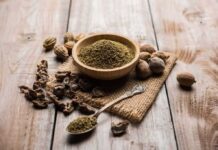What Are Chestnuts?
Chestnuts are an edible nut from trees are are in the same family as the beech tree. They grow in green, spiky shells that reveal the nut when peeled. They are typically in season in the UK from October to December. In contrast to other nuts, chestnuts have a low-oil and high-water content, hence their unique, soft texture.
Nutritional Benefits Of Chestnuts
A 100g serving of chestnuts (raw) provides:
- 170kcal / 719kj
- 2.0g protein
- 2.7g fat
- 36.6g carbohydrate
- 7.0g sugar
- 500mg potassium
- 5.5g fibre
Top 5 Health Benefits Of Chestnuts
1. Good source of antioxidants
Chestnuts contain a number of protective antioxidants, including vitamin C and the carotenoids lutein and zeaxanthin, plus various plant compounds including polyphenols such as gallic acid and tannins. These nutrients and plant compounds protect cells from damage and may help protect against chronic disease.
2. May support the heart
Being a source of polyphenols like gallic and ellagic acid, chestnuts may help protect the heart from oxidative stress. Chestnuts are also a good source of potassium, which is important for regulating blood pressure.
3. High in fibre
Chestnuts are a great source of fibre, which supports digestive function. The fibre also acts as a prebiotic, fuelling the gut bacteria and in turn helping maintain a healthy gut and gut environment.
4. May improve blood sugar management
Although chestnuts provide more carbohydrates than other nuts, the additional fibre they contain helps regulate its release. The antioxidants chestnuts contain, like gallic and ellagic acid, appear to improve our cells’ response to insulin, which makes overall blood sugar control more effective.
5. May help weight management
High in fibre, chestnuts may help curb your appetite in comparison with other nuts. They are also lower in fat and calories. Furthermore, promising animal studies suggest the addition of chestnut to the diet may reduce the accumulation of belly fat.
Are Chestnuts Safe For Everyone?
Chestnuts are in a different botanical category to the eight tree nuts that pose a common allergy risk. That said, some people may be allergic to chestnuts despite safely tolerating both peanuts and tree nuts.
Raw chestnuts are safe for most people to eat, but because they contain tannins, they may cause digestive disturbance and nausea in some individuals.
Healthy Chestnut Recipes
- Sprouts with chestnuts & crisp pancetta
- Mushroom & chestnut rotolo
- Roast parsnip & chestnut salad
- Sweet potato & chestnut roast with tangy tomato sauce
- Butternut, chestnut & lentil cake
- Roasted Brussels sprouts with bacon & chestnuts
Important Notice: This article was originally published at www.bbcgoodfood.com by Nicola Shubrook – A registered nutritionistwhere all credits are due. Reviewed by Kerry Torrens.
Disclaimer
The watching, interacting, and participation of any kind with anything on this page does not constitute or initiate a doctor-patient relationship with Dr. Farrah®. None of the statements here have been evaluated by the Food and Drug Administration (FDA). The products of Dr. Farrah® are not intended to diagnose, treat, cure, or prevent any disease. The information being provided should only be considered for education and entertainment purposes only. If you feel that anything you see or hear may be of value to you on this page or on any other medium of any kind associated with, showing, or quoting anything relating to Dr. Farrah® in any way at any time, you are encouraged to and agree to consult with a licensed healthcare professional in your area to discuss it. If you feel that you’re having a healthcare emergency, seek medical attention immediately. The views expressed here are simply either the views and opinions of Dr. Farrah® or others appearing and are protected under the first amendment.
Dr. Farrah® is a highly experienced Licensed Medical Doctor certified in evidence-based clinical nutrition, not some enthusiast, formulator, or medium promoting the wild and unrestrained use of nutrition products for health issues without clinical experience and scientific evidence of therapeutic benefit. Dr. Farrah® has personally and keenly studied everything she recommends, and more importantly, she’s closely observed the reactions and results in a clinical setting countless times over the course of her career involving the treatment of over 150,000 patients.
Dr. Farrah® promotes evidence-based natural approaches to health, which means integrating her individual scientific and clinical expertise with the best available external clinical evidence from systematic research. By individual clinical expertise, I refer to the proficiency and judgment that individual clinicians acquire through clinical experience and clinical practice.
Dr. Farrah® does not make any representation or warranties with respect to the accuracy, applicability, fitness, or completeness of any multimedia content provided. Dr. Farrah® does not warrant the performance, effectiveness, or applicability of any sites listed, linked, or referenced to, in, or by any multimedia content.
To be clear, the multimedia content is not intended to be a substitute for professional medical advice, diagnosis, or treatment. Always seek the advice of your physician or other qualified health providers with any questions you may have regarding a medical condition. Never disregard professional medical advice or delay in seeking it because of something you have read or seen in any website, video, image, or media of any kind. Dr. Farrah® hereby disclaims any and all liability to any party for any direct, indirect, implied, punitive, special, incidental, or other consequential damages arising directly or indirectly from any use of the content, which is provided as is, and without warranties.









